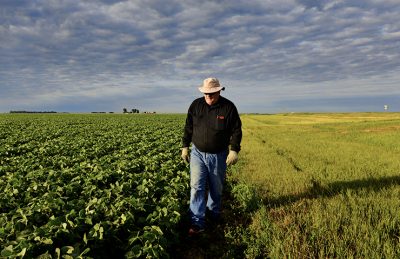“Death Sentence of WEF’s “Great Reset”: Uniting Local Farmers with Local Buyers. The Imperative of Our Time

All Global Research articles can be read in 51 languages by activating the “Translate Website” drop down menu on the top banner of our home page (Desktop version).
To receive Global Research’s Daily Newsletter (selected articles), click here.
Visit and follow us on Instagram at @crg_globalresearch.
***
Independent small and medium sized farms have been handed a death sentence by Klaus Schwab head of The World Economic Forum. Schwab, and fellow architects of top-down control, have officially let it be known that under the policy known as ‘Green Deal’ traditional family farms are no longer wanted and the foods they produce are to be replaced by laboratory and genetically engineered synthetic lookalikes. This policy is spelled-out in the pages of Klaus Schwab’s book ‘The Great Reset’ which is part of the envisaged ‘Fourth Industrial Revolution’.
The British government and the European Commission are committed to adopting this insane agenda in which working farmers are to be replaced by digitalised precision robots, as part of a so called Global Warming mitigation crusade. When properly analysed, this is revealed as a totalitarian programme for complete corporate and banking control of the food chain. A programme that is designed to eliminate the independent farmer.
What Are We Going to Do About It?
There is a very straight forward answer to this question. We are going come together at the local level and launch a mutually supportive initiative which will guarantee both the farmer and the purchaser of the farmer’s food a fair and mutually beneficial exchange.
How does it work?
Very simple. The purchaser (consumer) approaches his or her local responsible farmer and asks to buy some fresh produce. The farmer considers this proposition. Some may decline, but this will be because it has not occurred to them that the future of their current dependency on a corporate controlled marketing regime is completely untenable under the programme proposed by Mr Schwab.
Any good farmer will not turn down an opportunity to do business with near neighbours who are in search of positive and value-for-money farm-raised foods. Especially once the farming community realises that their future income will depend more and more upon establishing a market place amongst those in the immediate vicinity of his/her farm. Those who do not wish – or cannot any longer – purchase their staple food requirements from corporate owned super and hyper market food chains.
The Savvy Farmer
The savvy farmer can see the writing on the wall. Can see that slavery to a system of national and global manipulation – totally out of his/her hands – is a recipe for disaster. Such a farmer will be on the look-out for a secure local market; one where purchasers want to buy direct from the farm with no middle-man taking a cut. This must be the way forward if a secure future on the land is the desired outcome. Any intelligent farmer will recognise this and will take seriously a bona fide request to supply farm-raised produce to those eager to buy it.
The Savvy Consumer
The savvy consumer will be looking for fresh, healthy, flavourful good quality foods upon which to raise their family, or simply to feed themselves. They will recognise that the chance to acquire such food ‘direct from the farm’ represents the best possible outcome. A bond built-up with a local farmer, via regular purchasing of their farm raised products provides a powerful ally for times ahead when the commercial food chain is subjected to the brutal intervention of the architects of global control and shortages become the norm. Such times are no longer speculative. They are on our doorstep.
The Savvy Farmer and the Savvy Consumer – getting together
Either the consumer or the farmer can can take the initiative of bringing both parties together.
How?
By calling a ‘round table’ meeting in the local village/town hall or simply in your home. Invite one or two farmers to sit round that table with some individuals eager to obtain food direct from the farm. Some might even be ready to discuss contracting a farmer to grow the staple foods they require. Good quality food grown without recourse to chemical pesticides.
Farmers need a secure income and the buyers a secure local source of nutritious food. Fair prices for both parties and delivery or ‘pick-up from the farm’ can be negotiated in a friendly and informal manner. This is not purely ‘business’ in the old sense of the term; it is forming a common bond in a time when such bonds have been tragically neglected and supermarket convenience cultures have destroyed the links that hold communities together.
A new trading, bartering and sharing practice will be built around the adoption of this ‘proximity principle’. This is the one sure way of effectively resisting the Klaus Schwab farm killer and the New World Order plan for global domination of the food chain.
Other ways of supporting local trading include: farm shops, farmers markets, box schemes, food cooperatives. Get onto the front foot and regenerate your community – from the ground up!
For further details of the Proximity Principle and community regeneration see ‘Creative Solutions to a World in Crisis’ by Julian Rose.
*
Note to readers: Please click the share buttons above or below. Follow us on Instagram, @crg_globalresearch. Forward this article to your email lists. Crosspost on your blog site, internet forums. etc.
Julian Rose is an early pioneer of UK organic farming, writer, international activist, entrepreneur and holistic teacher. Julian is co-founder of HARE The Hardwick Alliance for Real Ecology see https://hardwickalliance.org/His acclaimed book ‘Overcoming the Robotic Mind – Why Humanity Must Come Through’ is particularly recommended reading for this time: see www.julianrose.info
He is a frequent contributor to Global Research.

